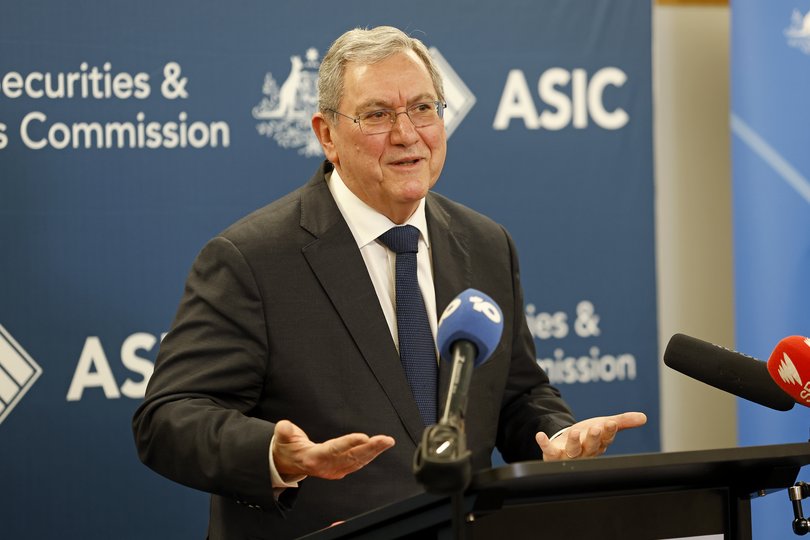AARON PATRICK: ANZ Bank’s history of bad behaviour is worse than it looks

Five years before the ANZ Banking Group made millions trading against its client — the Australian government — one of its employees sent up a warning signal.
He received information from a client that one of his bosses may have used the bank’s huge balance sheet to manipulate the bond market. A member of ANZ’s elite trading team in Sydney, the employee followed procedure and notified the compliance department.
After a brief investigation, the manager was cleared of doing anything wrong. Two months later, the attempted whistleblower realised the boss was trying to get him replaced. He quit in disgust.
Sign up to The Nightly's newsletters.
Get the first look at the digital newspaper, curated daily stories and breaking headlines delivered to your inbox.
By continuing you agree to our Terms and Privacy Policy.That was back in 2018. On April 19, 2023, two members of the same team sat in a cordoned-off room on ANZ’s trading floor in central Sydney. Watched by the same compliance department, over 34 minutes they flooded the market with sell orders, driving down the price of government bonds.
Such trading would normally be part of the regular ups and downs of a market few Australians understand. But ANZ was working on behalf of the agency that borrows for the federal government.
Given a highly coveted opportunity to help the government raise $14 billion, ANZ staff engaged in trades that caused a benchmark government bond to fall. At the same time, they bought a different bond that rose. The bank made a small fortune. The government, and the taxpayers of Australia, may have received tens of millions less than it could have.
Low point
ANZ had told the government its traders were some of savviest operators in the financial markets. Yet they sold its bonds at the lowest price of the day — a price they may have traded at for less than 20 seconds.
Called out immediately on its behaviour, the bank stonewalled. One hour later a government official called and asked, politely, what went wrong. “That, I think, should have been avoidable from ANZ’s side,” they said. “And, I wouldn’t mind (an) explanation . . . It’s a slightly bitter taste.”
The officials were still upset two days later. “My annoyance is the fact that we priced off a point which wasn’t a pricing point at all,” one official told ANZ. “You know, I get asked the question, and I’ve got to say publicly, you know, ‘what was the cost of that?’ Well, you know, it’s in the millions of dollars.”
On Monday, court documents revealed exactly what happened. Two ANZ traders, Rakesh Jampala and Christopher Corbett, did not tell their client, the government, while their trading pushed prices down. Australian taxpayers, through the government agency, were “in a position of informational and situational disadvantage and vulnerability,” a legal agreement between the ANZ and the corporate regulator said.

Cleared
Initially, after the government complained, the bank immediately cleared the two men. Not only was a senior member of the compliance department in the room watching Mr Corbett work, an internal review found “no unusual pattern was detected in his trading activities”.
When the Australian Securities and Investments Commission began an investigation, the bank spent two years providing misleading information, according to ASIC.
How much ANZ made on that day is unclear. It received $13 million as an official manager of the sale. ASIC estimated it made $26m in trading profits. ANZ refuses to concede it generated any trading profits or deliberately drove prices down, although offered to pay back $10m.
On Monday, ASIC said it had imposed a $125m fine for the actions of ANZ’s trading unit, which it said had engaged in unconscionable conduct. Other fines, which have to be approved by a court, took the total to $240m.
The total bill is larger. The scandal previously forced the bank to set aside $250m in extra capital, contributed to a shareholder strike against the bank’s remuneration report last year and cost previous chief executive Shayne Elliott more than $3m in bonuses.

Breaking news
I found out about the ASIC investigation into the bond trading in early 2024. After I reported it may have cost the government millions, the bank turned on me. An employee contacted a colleague and alleged that I had tried to obtain information about one of the traders from that man’s young son at his school.
The allegation was untrue. I did not know he had a child, and would never have approached him if I did. Apart from being unethical, it would have been pointless. Few 12-year-olds understand bond pricing.
ANZ declined to disclose on Monday what happened to Mr Jampala or Mr Corbett. But the head of all trading, Anshul Sidher, left last week as part of the 4500 job cuts imposed by new chief executive Nuno Matos.
This was not the first time ANZ, the smallest of largest four banks, has been caught behaving badly.
The bank has faced 11 investigations and court actions by regulators over the past decade, according to ASIC deputy chair Sarah Court. “It has to get its house in order,” she told The Nightly.
Shareholders, customers and clients must agree, because they’re the ones who pay for the bank’s mistakes.

